Filter by
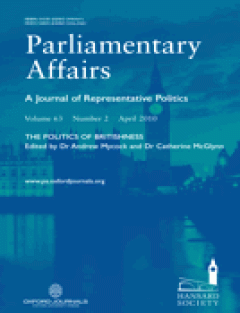
‘Having it All?’ Women MPs and Motherhood in Germany and the UK
The increase in the number of women MPs in many countries in recent years suggests that it is easier for women to enter politics nowadays than used to be the case. However, this does not mean that it is a level-playing field once they get there. Women still have to contend with prejudice and discrimination, antiquated practices, an alien culture, and a routine and timetable far more suited to m…
- Edition
- Vol. 64, No. 4, October 2011,pp. 714-736
- ISBN/ISSN
- 00312290
- Collation
- -
- Series Title
- Parliamentary Affairs
- Call Number
- -

Paths to Power : The Making of Cabinet Ministers in Turkey
This article examines the trends in the political and social pathways to the cabinet in the modern Turkish Republic. It intends to fill the lacunae in the literature on Turkey's cabinets and ministerial elites in several respects. First, it examines the cabinets and the changes and/or continuities in their composition from 1923 until 2009, a period which has not been covered in its entirety by …
- Edition
- Vol. 64, No. 4, October 2011.pp. 737-762
- ISBN/ISSN
- 00312290
- Collation
- -
- Series Title
- Parliamentary Affairs
- Call Number
- -

Transforming the Future Parliament Through the Effective Use of Digital Media
This article explores research undertaken as part of the Hansard Society's Parliament 2020 project undertaken in the UK, Canada, Chile and Australia, looking at how new technologies can transform internal parliamentary processes and the relationships different legislatures have with the public. It discusses the findings of focus groups and interviews conducted with parliamentarians, parliamenta…
- Edition
- Vol. 64, No. 4, October 2011,pp. 781-792
- ISBN/ISSN
- 00312290
- Collation
- -
- Series Title
- Parliamentary Affairs
- Call Number
- -
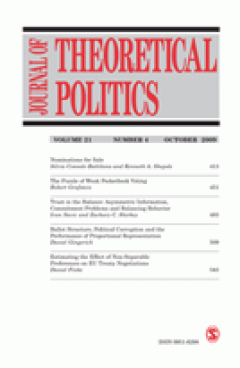
Representing collective reasons for group decisions : The judgment aggregatio…
This article argues that the discursive dilemma and the judgement aggregation which causes it are based on a misconception of what it means for a group to give reasons for a democratic decision. Judgement aggregation analyses fail to distinguish between the procedure for determining such a decision, which should involve a vote of all group members, and the process for determining the reasons fo…
- Edition
- Vol. 23 no. 4, October 2011,pp. 448-462
- ISBN/ISSN
- 09516298
- Collation
- -
- Series Title
- Journal of Theoretical Politics
- Call Number
- -

The influence of strategic retirement on the incumbency advantage in US House…
Failure to take into account �strategic retirement� leads to inflated estimates of the incumbent electoral advantage. The one attempt to address this issue in the context of US House elections implies that much of the supposed incumbency advantage and most of its presumed increase over time are illusory (Cox and Katz, 2002). This paper identifies possible problems with the Cox and Katz (2002) m…
- Edition
- Vol. 23 no. 4, October 2011,pp. 431-447
- ISBN/ISSN
- 09516298
- Collation
- -
- Series Title
- Journal of Theoretical Politics
- Call Number
- -

Pre-election polling and sequential elections
I consider a model in which the winner of a primary election faces a third candidate in a general election immediately thereafter. Prior to the primary election, there is a pre-election poll on how voters would vote in a hypothetical general election between one of the candidates in the primary election and the third candidate. I illustrate that voters have an incentive to misrepresent their vo…
- Edition
- Vol. 23 no. 4, October 2011,pp. 463-479
- ISBN/ISSN
- 09516298
- Collation
- -
- Series Title
- Journal of Theoretical Politics
- Call Number
- -

Jobs in politicians’ backyards : Party leadership competition and patronage
What are the factors that lead to variation in the clientelistic use of state resources in electoral contexts? In this article I provide one answer to this question by focusing on the role of intra-party politics and analyzing the empirical case of patronage jobs in the Argentine provinces between 1984 and 2001. Patronage jobs in provincial administrations help governors build political support…
- Edition
- Vol. 23 no. 4, October 2011,pp. 480-509
- ISBN/ISSN
- 09516298
- Collation
- -
- Series Title
- Journal of Theoretical Politics
- Call Number
- -

Unravelling Bueno De Mesquita’s group decision model
Political scientist Professor Bruce Bueno De Mesquita, has made significant claims for the predictive accuracy of his computational model of group decision making, receiving much popular press, including newspaper articles, books and a television documentary entitled �The New Nostradamus�. Despite these and many journal and conference publications related to the topic, no clear elucidation of t…
- Edition
- Vol. 23 no. 4, October 2011, pp. 510-531
- ISBN/ISSN
- 09516298
- Collation
- -
- Series Title
- Journal of Theoretical Politics
- Call Number
- -

The role of procedural commitment in informational theories of legislative or…
Contrary to codified procedures, almost all informational theories of legislative organization assume that the House floor commits to a special rule for floor consideration prior to a committee proposal. Employing Gilligan and Krehbiel�s (1989b) theoretical framework, we demonstrate that whether or not to assume this procedural commitment has a profound impact on our understanding of how the fl…
- Edition
- Vol. 23 no. 4, October 2011,pp. 532-558
- ISBN/ISSN
- 09516298
- Collation
- -
- Series Title
- Journal of Theoretical Politics
- Call Number
- -
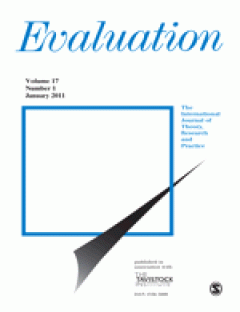
The real functions of evaluation and response systems
This article is intended to contribute to the understanding of evaluation use in the context of policy making and governance. It does this, first, by developing a framework that sets out the prerequisites of six possible functions of an evaluation �management response system�; and second, by analysing three aid organizations� management response systems in relation to this framework. The prereq…
- Edition
- Vol. 17 no. 4, October 2011,pp. 327-349
- ISBN/ISSN
- 09516298
- Collation
- -
- Series Title
- Evaluation
- Call Number
- -

Sense and complexity : Initiatives in responsive performance audits
Many policy programmes yield disappointing results. Like policy evaluation, performance audit aims to help policy makers by uncovering barriers to success and suggesting improvements. Traditionally, performance audit relies heavily on policy objectives, norms, and criteria while focusing on the responsibility of a specific government entity (e.g. a ministry or an agency). More recently, however…
- Edition
- Vol. 17 no. 4, October 2011,pp. 351-363
- ISBN/ISSN
- 13563890
- Collation
- -
- Series Title
- Evaluation
- Call Number
- -

Deriving collaborative aims and outcomes : A case-study of cross-border coope…
This article draws on a study of cross-border cooperation in Central and Eastern Europe to examine the ways in which common aims are derived in collaborative ventures. It identifies that a lack of clarity can emerge as aims can be variously derived, belong to a single agency or be owned by individual actors. Aims may also be externally imposed by funding bodies. Aims can be explicit and thus op…
- Edition
- Vol. 17 no. 4, October 2011,pp. 365-382
- ISBN/ISSN
- 13563890
- Collation
- -
- Series Title
- Evaluation
- Call Number
- -

Using social network analysis to evaluate a complex policy network
There are many challenges in evaluating international networks within the fields of health and international development. Use of conventional tools is not only difficult but may fail to provide the kind of information that is developmentally useful. Social network analysis tools offer many benefits for network evaluators. In particular, they allow documentation and analysis of inter-relationshi…
- Edition
- Vol. 17 no. 4, October 2011,pp. 383-394
- ISBN/ISSN
- 13563890
- Collation
- -
- Series Title
- Evaluation
- Call Number
- -
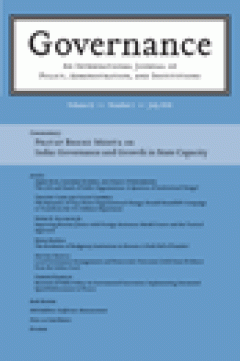
The Limits of Policy Diffusion : Introducing International Norms of Anti-Mone…
This article examines the contribution of policy diffusion to create a regulatory system against money laundering in China. A two-level analysis of transnational interactions and domestic law making shows how Communist Party prerogatives shape the insertion of multilateral norms into the legal system. In a contentious process of local accommodation, transnationally engaged technocratic bodies, …
- Edition
- Volume 24, Issue 4, October 2011, pages 639–664
- ISBN/ISSN
- 09521895
- Collation
- -
- Series Title
- Governance
- Call Number
- -

Delegation and Institutional Design in Health-Care Rationing
The delegation of decision-making powers to nonmajoritarian, independent agencies has become a significant phenomenon in more and more policy areas. One of these is the health-care sector, where decisions on the range of services covered within public systems have, in most developed countries, been delegated to specialized bodies. This article offers an analytical framework that seeks to grasp …
- Edition
- Volume 24, Issue 4, October 2011, pages 665–688
- ISBN/ISSN
- 09521895
- Collation
- -
- Series Title
- Governance
- Call Number
- -

What Drives Reforms in International Organizations ? External Pressure and Bu…
This article explores organizational dynamics that go with the design and implementation of public administration reforms within the United Nations (UN) system. It focuses on management reforms carried out in the UNAIDS Programme, which brings together 10 UN agencies to combat the worldwide HIV/AIDS epidemic. The article suggests that understanding these reforms requires questioning the exposur…
- Edition
- Volume 24, Issue 4, October 2011, pages 689–712
- ISBN/ISSN
- 09521895
- Collation
- -
- Series Title
- Governance
- Call Number
- -

Explaining Variation in the Effectiveness of Transnational Energy Partnerships
This article analyzes the effectiveness of transnational multi-stakeholder partnerships for sustainable development�also known as �Type II outcomes� of the 2002 World Summit on Sustainable Development�in the sustainable energy sector. We combine quantitative and qualitative research. Quantitatively, we use a database of 340 partnerships, including 46 partnerships that focus on energy. Our quali…
- Edition
- Volume 24, Issue 4, October 2011, pages 713–736
- ISBN/ISSN
- 09521895
- Collation
- -
- Series Title
- Governance
- Call Number
- -
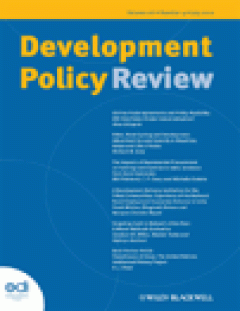
Getting Real About Food Prices
The 2008 spike in world grain prices is widely recognised to have had serious impacts on food security and poverty, but these high grain prices are commonly described as low in historical terms � an inconsistency resulting from the use of advanced- and global-economy price indices in calculating real prices. This ignores the high share of food in poor people's expenditures and the indirect effe…
- Edition
- Volume 29, Issue 6, November 2011, pages 647–664
- ISBN/ISSN
- 09506764
- Collation
- -
- Series Title
- Development Policy Review
- Call Number
- -

The Right Price of Food
Only a few years ago the widely shared view was that low food prices were a curse to developing countries and the poor. Their dramatic increase in 2006�8 appears to have altered this view fundamentally. High food prices are now judged to have a devastating effect on developing countries and the world's poor � a reversal of opinion that raises questions about the old and the new arguments and th…
- Edition
- Volume 29, Issue 6, November 2011, pages 667–688
- ISBN/ISSN
- 09506764
- Collation
- -
- Series Title
- Development Policy Review
- Call Number
- -

Impact of Public and Private Cash Transfers on Poverty and Inequality : Evide…
This article investigates the extent to which public and private transfers affected poverty and inequality in Vietnam in the mid-2000s. It finds that the impact of public transfers on poverty was negligible, due to the low coverage of the poor and the relatively small amounts transferred. Moreover, the effect of the receipt of transfers on expenditures was small: recipients decreased the labour…
- Edition
- Volume 29, Issue 6, November 2011, pages 689–728
- ISBN/ISSN
- 09506764
- Collation
- -
- Series Title
- Development Policy Review
- Call Number
- -
 Computer Science, Information & General Works
Computer Science, Information & General Works  Philosophy & Psychology
Philosophy & Psychology  Religion
Religion  Social Sciences
Social Sciences  Language
Language  Pure Science
Pure Science  Applied Sciences
Applied Sciences  Art & Recreation
Art & Recreation  Literature
Literature  History & Geography
History & Geography